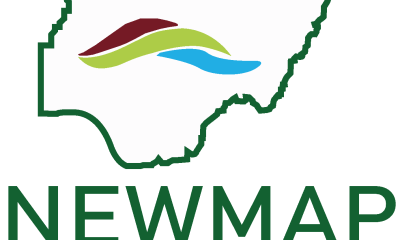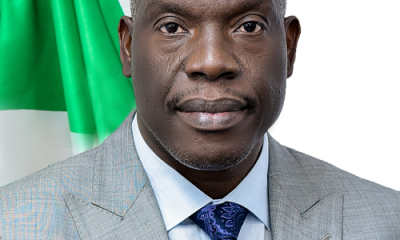FOREIGN NEWS
EU Supports IDPs In Five Nigerian States With €15m

The European Union (EU) has committed €15 million to support the needs of internally displaced persons (IDPs) and deliver protection assistance and durable solutions in Yobe, Adamawa, Kano, Sokoto, and Benue States.
EU Ambassador to Nigeria and ECOWAS, Ambassador Gautier Mignot, announced this in Abuja at the launch of the EU Support for Internally Displaced Persons in Yobe, Adamawa, Benue, and Kano States (SIDPIN) and the EU Support for Protection, Assistance, and Durable Solutions in Sokoto (SPADS).
Mignot stated that the two interventions, totaling €15 million, reflect the European Union’s strong commitment to advancing human dignity, resilience, and sustainable development for displaced persons and their host communities.
He said, “Working alongside Federal and State authorities, our partners, including the International Organization for Migration (IOM), United Nations Human Settlements Programme (UN-Habitat), United Nations High Commissioner for Refugees (UNHCR), and Danish Refugee Council (DRC), will spearhead this initiative by focusing on local integration in urban and urbanising areas, adopting a multi-scale, integrated, and area-based territorial approach.”
“The overall objective of these actions is to strengthen durable solutions through local integration, with a specific focus on women and children.”
“We aim to improve the living conditions of displaced populations and host communities in Adamawa, Yobe, Benue, Kano, and Sokoto States through sustainable local urban integration approaches that are replicable and scalable.”
He also noted that displacement in Nigeria, particularly in the northeast, north central, and northwest, has affected over 3.5 million people.
The envoy emphasised that these individuals are not mere statistics, but “lives interrupted, dreams deferred, families torn from their homes, and futures put on hold.”
He added, “Many of these IDPs want to return home to the places they were forced to leave.”
“However, some cannot do so in the foreseeable future, especially because security conditions do not allow it. Others have chosen to remain where they were resettled, and this is a respectable personal choice.”
He stated that the European Union believes the response must extend beyond emergency aid.
Mignot said, “We must examine the root causes of displacement, and equally importantly, the pathways to sustainable solutions.”
“Our two projects will not only address immediate challenges but also contribute to laying the foundation for long-term stability, urban resilience, and peaceful coexistence – outcomes that benefit everyone.”
“This is why these projects focus on integration in urban and urbanizing areas to support those staying in town.”
“We acknowledge the leadership of the Government of Nigeria, at both the federal and state levels, in making these projects possible.”
“They were developed through a consultative process involving MDAs, state governments, IDPs, and host communities to ensure that they align with the needs and priorities of our Nigerian partners.”
“At the heart of our vision is the principle of local ownership and leadership. True progress happens when communities are empowered, when governments take the lead, and when development is rooted in participation, inclusion, and equity.”
Mignot commended the implementing partners, IOM, UNHCR, UN-Habitat, and the Danish Refugee Council, for their expertise, dedication, and shared vision of a better future for displaced persons.
He expressed optimism that the launch of SIDPIN and SPADS would mark the beginning of a new chapter in “how we respond to displacement, not only in Nigeria but also as a model for the region.”
“Together, we can ensure that no one is left behind, and that every displaced person has the opportunity not just to survive, but to rebuild their life, to meaningfully contribute to communities, and become self-reliant,” he said.
In his remarks, the Governor of Benue State, Hyacinth Alia, thanked the EU and all the implementing partners for their unwavering support.
He pledged the state government’s support and cooperation for the implementation of the projects.
On his part, the UN Resident and Humanitarian Coordinator, Mohamed Fall, noted that the EU Support for Internally Displaced Persons in Yobe, Adamawa, Benue, and Kano States (SIDPIN), and the EU Support for Protection, Assistance and Durable Solutions in Sokoto State (SPADS) initiatives are vital because they address core issues of human dignity. They are about restoring lives interrupted by conflict and displacement, ensuring that children can grow in safe environments, and that women and men can rebuild their futures with dignity and opportunity.
He added, “As the UN Secretary-General has reminded us, “leaving no one behind is not a slogan—it is a commitment.” Today, we reaffirm that commitment in Nigeria.”
“For Nigeria, these programmes are important because displacement challenges go beyond humanitarian needs; they affect development, stability, and peace. Nigeria is a nation of extraordinary resilience and potential.
“By addressing displacement with durable solutions, we are strengthening the social fabric, deepening trust in institutions, and creating pathways to achieve the Sustainable Development Goals.
“In doing so, we help secure a future where prosperity is shared, and no community is excluded from progress.”
He said, “The United Nations in Nigeria is fully aligned with this vision. Through the UN Sustainable Development Cooperation Framework (2023–2027), we are working with the government and partners to integrate durable solutions into broader development planning.
“These initiatives are anchored in the triple nexus—linking humanitarian action, peace, and development. They aim not only to respond to urgent needs but also to build resilience, expand access to services, and empower communities to thrive.”
The “Sustainable Urban Integration of Displaced Populations in Adamawa, Yobe, and Kano States in Nigeria (SIDPIN)” and the “EU Support for Protection, Assistance, and Durable Solutions in Sokoto (SPADS)” projects are part of a multi-agency effort to address displacement through sustainable urban integration, with a strong focus on women, children, and vulnerable groups.
Developed through an inclusive consultative process involving State Governors, relevant Federal and State Ministries, Departments, and Agencies (MDAs), IDP communities, and other stakeholders, the projects align with both national and state displacement action plans, as well as the European Union’s regional protection and solutions strategy for West Africa.
-
CRIME4 years ago
PSC Dismisses DCP Abba Kyari, To Be Prosecuted Over Alleged $1.1m Fraud
-
FEATURED4 years ago
2022 Will Brighten Possibility Of Osinbajo Presidency, Says TPP
-
FEATURED2 years ago
Buhari’s Ministers, CEOs Should Be Held Accountable Along With Emefiele, Says Timi Frank
-
BUSINESS & ECONOMY2 years ago
Oyedemi Reigns As 2023’s Real Estate Humanitarian Of The Year
-
SPORTS2 years ago
BREAKING: Jürgen Klopp Quits Liverpool As Manager At End Of Season
-
SPORTS2 years ago
Could Liverpool Afford Kylian Mbappe For €200 million? Wages, Transfer Fee
-
ENTERTAINMENT2 years ago
Veteran Nigerian Musician, Basil Akalonu Dies At 72
-
FEATURED2 years ago
Tribunal Judgement: Peter Obi Warns Of Vanishing Electoral Jurisprudence, Heads To Supreme Court
-
BUSINESS & ECONOMY2 years ago
Oyedemi Bags ‘Next Bulls Award’ As BusinessDay Celebrates Top 25 CEOs/ Business Leaders
-
FEATURED3 years ago
2023 Presidency: South East PDP Aspirants Unite, Demand Party Ticket For Zone


































